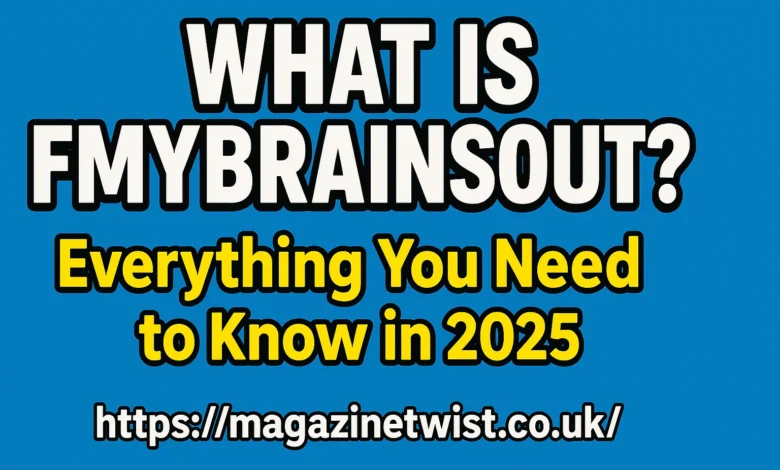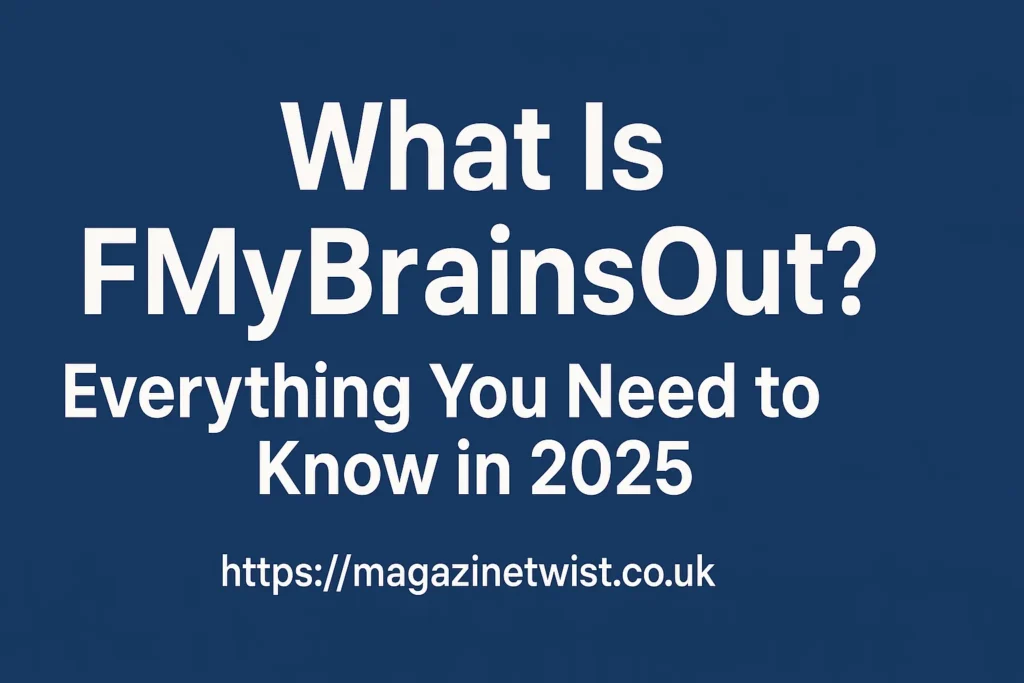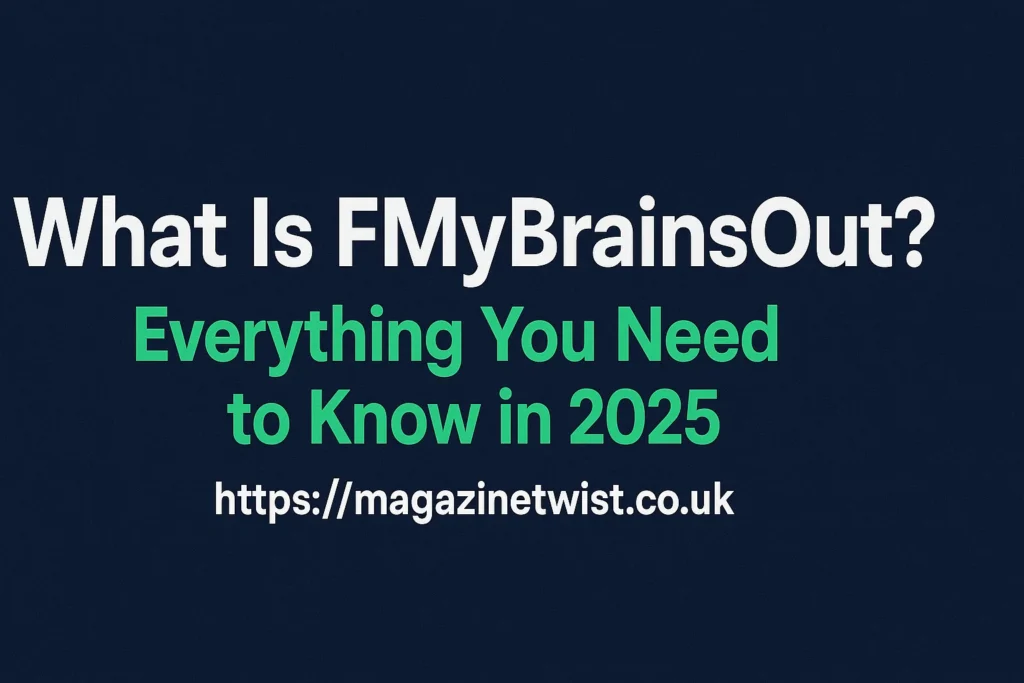What Is FMyBrainsOut? Everything You Need to Know in 2025

FMyBrainsOut the ever-evolving world of internet culture, few phrases capture raw emotion and intense personal expression quite like it. From its mysterious origins to its current cultural relevance, the term has transformed from obscure online slang into a widespread digital identity for those who embrace emotional honesty, vulnerability, and unfiltered creativity. Whether you’ve come across it in memes, blogs, podcasts, or Twitter threads, It has grown into something far deeper than a mere expression—it’s now a form of online therapy, self-expression, and even art.
This article explores the essence of fmybrainsout, its origins, how it’s used, where it’s popular, and why it’s resonating so strongly in 2025.
The Meaning Behind FMyBrainsOut

At first glance, It might sound abrasive or confusing. Some mistake it for a vulgar or exaggerated emotional outburst, but its modern interpretation has shifted. In today’s usage, fmybrainsout represents a state of intellectual and emotional overload—a need to express overwhelming thoughts, creativity, or mental stress in a raw, uncensored way.
It’s not just about venting; it’s about offloading everything in your mind—from chaotic ideas to emotional baggage—to gain clarity or release. It resonates most with creatives, thinkers, mental health advocates, and internet-savvy individuals who are tired of filters and curated content.
The Origins and Internet Evolution
Like many internet-born expressions, the exact origin of fmybrainsout is difficult to trace. It seems to have first appeared in Tumblr posts and Twitter threads in the early 2010s as a hyperbolic way to express frustration or astonishment. Over time, the term evolved into an umbrella concept for emotional brain-dumping, much like journaling or tweeting without a filter.
By the mid-2020s, the term had found a home on platforms like Reddit, Medium, and YouTube, where creators used it as a tag or title for content that involved deep thoughts, intense creativity, or emotionally raw narratives. It’s also been embraced by artists, poets, and content creators who seek to share mental overload moments as part of their digital storytelling.
FMyBrainsOut as a Digital Lifestyle
In 2025, fmybrainsout is more than a phrase—it’s a digital lifestyle embraced by communities that value authenticity over perfection. This culture stands in contrast to heavily filtered social media lives. Instead of flexing curated moments, users in the fmybrainsout sphere post stream-of-consciousness texts, confessions, raw art, or spoken-word content.
This lifestyle is about:
- Expressive vulnerability
- Creative freedom without judgment
- Mental release through online community
- Rejecting the polished highlight reel
People use the hashtag #fmybrainsout on platforms like TikTok and Instagram Threads when posting thoughts that feel too real or intense for regular social media norms.
Where You’ll Find FMyBrainsOut Online
The hashtag and culture surrounding fmybrainsout can be found across various platforms:
Subreddits like r/offmychest and r/TrueOffMyChest often host the kind of open and honest discussions that reflect the fmybrainsout mindset.
Tumblr
Still a hub for emotional content and unfiltered creativity, Tumblr is a breeding ground for the movement, especially with writing, art, and poetry.
YouTube & Podcasts
Creators are launching entire channels and podcasts with the name or theme of fmybrainsout—discussing mental health, creativity, and social burnout.
Twitter/X and Threads
Quick mental unloads, raw opinions, and chaotic thought threads use the term frequently.
FMyBrainsOut.net (Unofficial Platforms)
Some independent bloggers have started publishing content under this brand to reflect mental clarity and emotional expression.
The Mental Health Connection
A key reason why fmybrainsout resonates so deeply is its connection to mental health awareness. The digital age has made it easier to connect with others, but also more difficult to escape information overload and emotional burnout. FMyBrainsOut is like a relief valve—a digital therapy of sorts.
People use it to:
- Express anxiety, confusion, or emotional fatigue
- Share unprocessed thoughts in a judgment-free zone
- Replace polished perfectionism with messy, real dialogue
Some even view it as a form of self-directed therapy, where the act of brain-dumping can help reduce mental clutter and allow for emotional processing. It complements existing movements around journaling, therapy apps, and mindfulness practices.
FMyBrainsOut in Creative Communities

Artists, writers, poets, and musicians are among the most prominent adopters of fmybrainsout culture. Creative minds often deal with intense thought cycles, and the fmybrainsout concept gives them a way to release those thoughts without fear of judgment.
Examples include:
- Writers publishing experimental freewriting under the tag
- Visual artists posting sketches labeled #fmybrainsout to show unfinished but honest work
- Musicians releasing acoustic demos with raw lyrics reflecting inner chaos
- Spoken word poets using the phrase to perform vulnerable monologues
This movement empowers creators to showcase work-in-progress material, challenge perfectionism, and redefine what it means to “share” online.
The Rise of FMyBrainsOut Merch & Branding
With popularity comes branding. In 2025, you’ll find t-shirts, stickers, journals, and even digital planners branded with “FMyBrainsOut.” These products usually target Gen Z and millennial audiences who relate to the aesthetic of overwhelmed brains and emotional openness.
Some mental health advocacy groups have also adopted the term for awareness campaigns, promoting the idea that letting it all out is a vital part of healing.
Popular merch themes include:
- “Dump your brain here” journals
- “FMyBrainsOut” therapy coloring books
- Minimalist tees with emotional quote snippets
This shows how a chaotic phrase has turned into a mental health identity badge.
Critics and Cautions
Despite its emotional and creative value, fmybrainsout isn’t without critics. Some argue that it encourages oversharing, which can backfire emotionally or professionally. Others worry about triggering content being shared without context or support structures.
Common criticisms include:
- Potential exploitation of personal trauma for views
- Encouraging impulsive posting that leads to regret
- Lacking moderation or safety nets for vulnerable individuals
That said, many communities are adopting community guidelines and content warnings to maintain respectful and supportive environments. Like any tool, the key lies in intent and moderation.
How to Embrace the FMyBrainsOut Mindset
If you’re intrigued by the concept, here’s how to try it in a healthy, helpful way:
- Start privately – Use a personal journal or notes app to release your thoughts.
- Use content warnings – If you share online, let readers know what they’re about to see.
- Engage with like-minded communities – Reddit, Tumblr, and Twitter/X are good starts.
- Balance honesty with self-care – You don’t owe the internet your trauma.
- Create before you edit – Let your thoughts flow first, then shape them for clarity later.
This mindset isn’t about being messy for attention—it’s about honoring your brain’s chaos and finding beauty in the truth you rarely share.
The Future of FMyBrainsOut in Online Culture
As digital spaces grow more complex and mental health becomes more central in public discourse, movements like fmybrainsout are likely to expand and diversify. In 2025, expect to see:
- More apps using the term for emotional journaling
- New creative collectives that focus on raw storytelling
- Brands aligning with the movement to promote mental health products
- Mainstream influencers adopting the phrase to show authenticity
What started as a slang expression has now become a mantra for a new kind of digital citizen—someone brave enough to say: “Here’s everything I’m thinking and feeling, unfiltered.”
Final Thoughts
FMyBrainsOut is more than a viral catchphrase. It’s a call to action, a digital mirror, and a tool for emotional clarity. Whether you see it in a tweet, a blog post, a podcast, or a T-shirt, remember that behind those three chaotic words lies a powerful idea: you don’t need to hide your thoughts to be accepted.
In a world filled with curated perfection, fmybrainsout is a refreshing reminder that realness matters. And in 2025, that might just be the most powerful thing we can share online.
